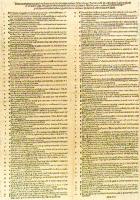Track back to Albert Mohler's blog:
Positive:
1. Some of what we are learning about Harriet Miers is genuinely encouraging. She has been identified as an evangelical Christian with deep Christian commitments. Ms. Miers is a member of Valley View Christian Church in Dallas where Dr. Barry McCarty is pastor. Southern Baptists will recognize Dr. McCarty through his service as parliamentarian at recent meetings of the Southern Baptist Convention. I know him well, and I know that this is a conservative church. Those who know her speak of her with great admiration and confidence.
2. Her background is unconventional. This is a positive factor as well as a potential negative in some eyes. In the positive sense, this means that Harriet Miers is not a product of the tight and relatively insulated world of legal scholarship and the judiciary. Her real-world experience in litigation, management, church, and life means that she is less likely to fall prey to the "inside the beltway" syndrome.
3. Her legal experience is stellar. Though she has never sat on the bench as a judge, she is one of the nation's most recognized lawyers. She served as the first woman president of the Dallas Bar Association and later served as president of the State Bar of Texas. She had been nominated to the second-highest office in the American Bar Association when she withdrew from the election to accept appointment to the White House staff. She served as chair of the ABA's Commission on Multijurisdictional Practice. The National Law Journal named her as one of the nation's 100 most powerful attorneys and of the top 50 women lawyers in America. She has now served for several years as a senior member of the White House staff.
4. She has been a major player in President Bush's judicial nominations. Harriet Miers has been responsible for advising the President on judicial nominations to all federal courts, including the nomination of John Roberts as Chief Justice. By all accounts, President Bush's nominees reflect her vision of the courts and the Constitution. This is most encouraging.
5. She was nominated by someone who knows her very well -- President George W. Bush. Conservatives who have long been troubled by the courts are always (justifiably) concerned that every new nominee is another David H. Souter. In other words, another nominee represented as a conservative who, once on the bench, turns out to be another judicial activist. There are two reasons why this is not likely to be a good analogy in this case. In the first place, President George H. W. Bush had no personal knowledge of David Souter when he nominated him to the Supreme Court in 1990. President George W. Bush has known Harriet Miers for over a decade and has worked with her closely. As the President made clear in his remarks yesterday, he knows Harriet Miers very well, and he trusts her heart. Given the fact that she worked so closely with the President on judicial appointments, this is a significant positive factor. Secondly, President Bush has established a track-record of outstanding judicial nominations at every level, even as he has articulated a vision of judicial philosophy and constitutional interpretation that should give us confidence. As I see it, the President deserves our support for this nomination unless clear evidence should indicate otherwise. I do not expect any such evidence to appear.
Some lament that potential nominees like Michael Luttig and Michael McConnell were not chosen. I understand, appreciate, and share their concern. We should all lament that we are living in a political context which makes the nomination of outstanding conservative jurists like these all but impossible. The only way to change this situation is to change the political context -- and that is no small challenge. There is much work to do and much ground to recover.
For now, we await the confirmation hearings for Harriet Miers and the 110th justice of the U.S. Supreme Court. Her nomination deserves our support and close attention.












